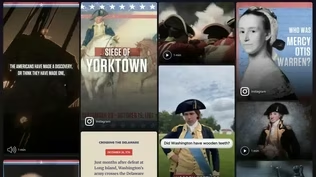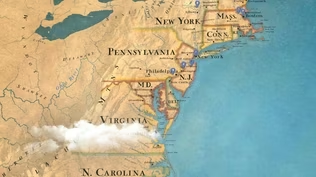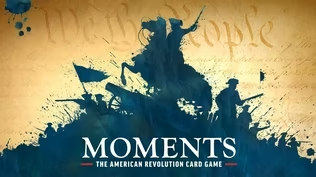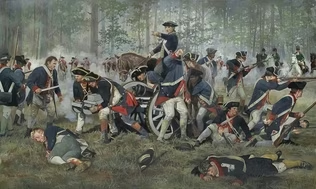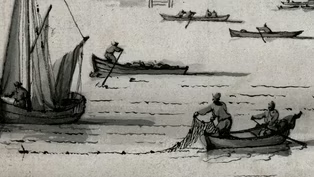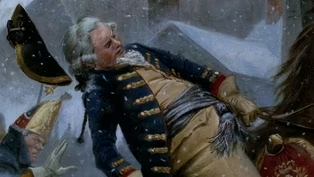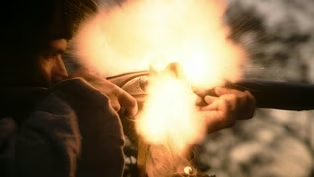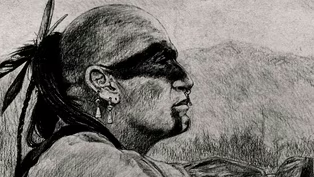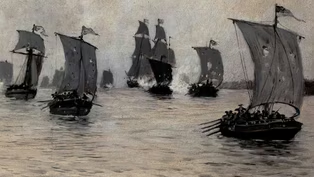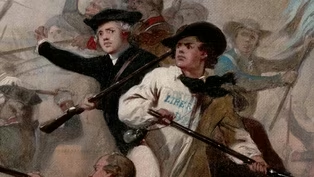
Democracy & The Adoption of the Articles of Confederation
Clip: Episode 3 | 6m 14sVideo has Closed Captions
The Continental Congress meets to debate and adopt the Articles of Confederation.
The Continental Congress convenes in Philadelphia to debate the Articles of Confederation: the document that will formally bind all 13 states together. The debates last weeks as Congress discusses taxation, border disputes and the autonomy of states. As the debates continue, Abigail Adams urges her husband to consider the rights of women in this new country.
Problems playing video? | Closed Captioning Feedback
Problems playing video? | Closed Captioning Feedback
Episodes presented in 4K UHD on supported devices. Corporate funding for THE AMERICAN REVOLUTION was provided by Bank of America. Major funding was provided by The Better Angels Society and...

Democracy & The Adoption of the Articles of Confederation
Clip: Episode 3 | 6m 14sVideo has Closed Captions
The Continental Congress convenes in Philadelphia to debate the Articles of Confederation: the document that will formally bind all 13 states together. The debates last weeks as Congress discusses taxation, border disputes and the autonomy of states. As the debates continue, Abigail Adams urges her husband to consider the rights of women in this new country.
Problems playing video? | Closed Captioning Feedback
How to Watch The American Revolution
The American Revolution is available to stream on pbs.org and the free PBS App, available on iPhone, Apple TV, Android TV, Android smartphones, Amazon Fire TV, Amazon Fire Tablet, Roku, Samsung Smart TV, and Vizio.
Buy Now
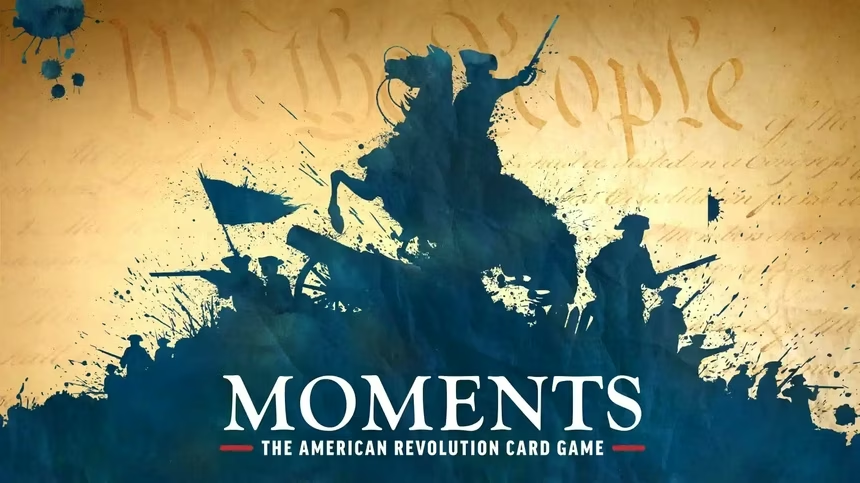
MOMENTS: The Revolutionary War Card Game
Use your knowledge of Revolutionary-era moments to build a timeline of real historical events.Providing Support for PBS.org
Learn Moreabout PBS online sponsorship♪ Voice: We have been sent into life at a time when the greatest lawgivers of antiquity would have wished to have lived, when, before the present epocha, had 3 millions of people full power and a fair opportunity to form and establish the wisest and happiest government that human wisdom can contrive.
[Gavel bangs] John Adams.
♪ Narrator: As Washington and Howe faced off against one another in New York, in Philadelphia, the Continental Congress had been laboring to adopt Articles of Confederation, meant to formally bind all 13 states together while also guaranteeing the independence of each, a first tentative step toward a permanent government for the new United States.
♪ Taylor: When we think about our American Revolution, we, of course, think about independence from Britain, and that's a big deal, but we also need to think about this is the formation of republican government, and it's also the formation of our union of our states, and all 3 of those were enormous gambles.
They were unprecedented.
There had never been the foundation of a republic out of a revolution... [Gavel bangs] and these 13 colonies had had bitter rivalries with one another, and so forming a union out of these states was gonna be as difficult as achieving independence from Britain.
[Gavel banging rapidly] Narrator: Congress debated draft articles for weeks on the first floor of the Pennsylvania State House, where they had just declared independence in July.
They were held up over a host of issues, including apportionment, boundary disputes, taxation, and autonomy of the individual states.
Congress was a disputatious assembly and not necessarily an efficient assembly through these years.
Yes, they are running a war.
Yes, they are founding a nation, but there's also a tremendous amount of infighting.
There's a tremendous amount of inertia.
There are more committees than anyone could count, and there were secret committees.
For example, the first person sent to France to solicit aid from the French for the Revolution is sent without the knowledge of the rest of Congress.
As John Jay will later say to George Washington, "There is as much intrigue in Congress "as there is at the Vatican, and as little secrecy as there is in a boarding school."
♪ Narrator: Meanwhile, upstairs in the same building, the Commonwealth of Pennsylvania held a convention of its own to establish its government.
Similar meetings were being held in other states.
All of the new constitutions would guarantee freedom of the press, fair trials, and due process under law and made sure power rested not with autocratic governors, but with legislators elected by propertied men.
Pennsylvania took things a step further.
They created the most egalitarian constitution in the new United States with a Bill of Rights and a one-house legislature elected by taxpaying workingmen as well as property owners, all of which worried many of the delegates downstairs.
William Hogeland: Pennsylvania had a radical constitution where almost any White, free man could vote and stand for office, which had never happened before pretty much anywhere.
People were committed to using the revolution to make it a real social revolution, a real economic revolution, and get free, working people-- men, White men-- a say in government, which was a radical idea at the time.
John Adams wasn't for that.
Samuel Adams wasn't for that.
Richard Henry Lee wasn't for that.
When John Adams read that constitution, his response was, quote, "Good God!"
♪ Voice: In the new code of laws, I desire you would remember the ladies and be more generous and favorable to them than your ancestors.
Do not put such unlimited power into the hands of the husbands.
Remember, all men would be tyrants if they could.
If particular care and attention is not paid to the ladies, we are determined to foment a rebellion and will not hold ourselves bound by any laws in which we have no voice or representation.
Abigail Adams.
Voice: There will be no end of it.
New claims will arise.
Women will demand a vote.
Lads from 12 to 21 will think their rights not enough attended to, and every man who has not a farthing will demand an equal voice with any other in all acts of state.
It tends to confound and destroy all distinctions and prostrate all ranks to one common level.
John Adams.
Hogeland: It's a misconception to think of the founders as being pro-democracy, but I think it's also a misconception to think that their failure to be democratic is some sort of flaw or error or something they just kind of missed.
They were very adamantly opposed to democracy.
Democracy came to America, with all of the problems that came with it, not as a direct purpose of the American Revolution, really, but as an unintended consequence.
Narrator: By the time Pennsylvania had ratified its constitution, the debates over the Articles of Confederation downstairs in Congress had become so heated, the prospect of compromise seemed so remote that the delegates agreed to table the subject.
Frustrated and worried about his sick wife, Thomas Jefferson returned home to Virginia, the place he still called "my country."
The Battle of Long Island (Brooklyn)
Video has Closed Captions
Clip: Ep3 | 6m 10s | General Clinton ambushes George Washington in the largest battle of the American Revolution. (6m 10s)
Video has Closed Captions
Clip: Ep3 | 6m 44s | Washington devises a bold plan to cross the Delaware River and attack Trenton on Christmas night. (6m 44s)
Preview: The Times That Try Men’s Souls
Video has Closed Captions
Preview: Ep3 | 30s | Washington abandons New York City and flees across New Jersey, before attacking Trenton. (30s)
Tsi'yu-gunsini and the American Revolution on the Frontier
Video has Closed Captions
Clip: Ep3 | 5m 48s | Cherokee chief Tsi'yu-gunsini, Dragging Canoe in English, fights against Patriot settlers. (5m 48s)
Warpath of Nations: The Naval Battle That Prevented a Canadian Invasion
Video has Closed Captions
Clip: Ep3 | 5m 46s | Horatio Gates and Benedict Arnold rush to stop the British sailing down Lake Champlain. (5m 46s)
Video has Closed Captions
Clip: Ep3 | 5m 24s | The British assault Breed's Hill and Bunker Hill near Boston in the bloodiest battle of the war. (5m 24s)
Providing Support for PBS.org
Learn Moreabout PBS online sponsorshipSupport for PBS provided by:
Episodes presented in 4K UHD on supported devices. Corporate funding for THE AMERICAN REVOLUTION was provided by Bank of America. Major funding was provided by The Better Angels Society and...

